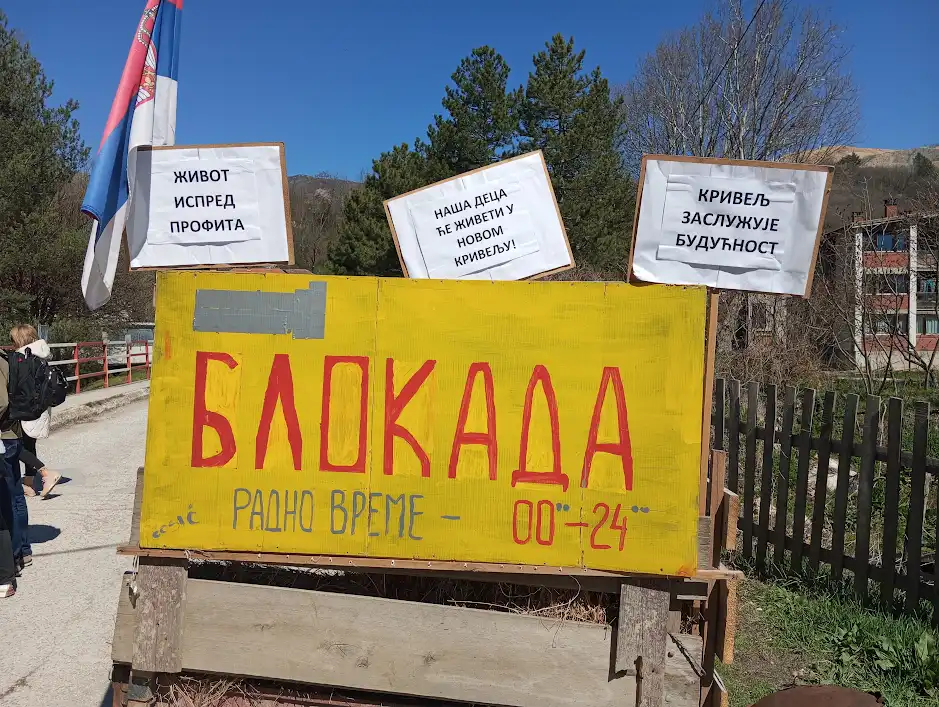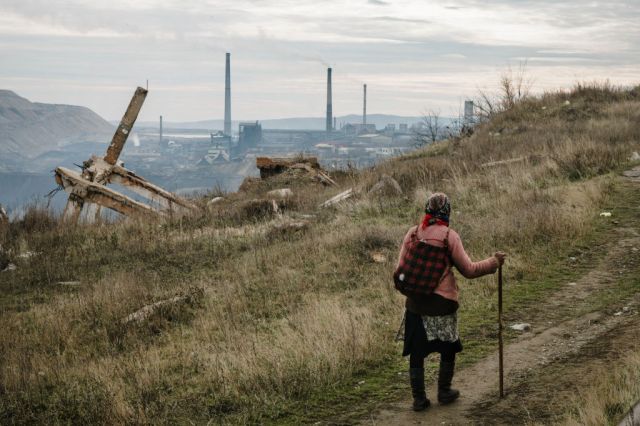
A tiny hay-cart blocks the path to a vast Chinese-owned copper mine. From it hangs a hand-painted sign that reads “life before profits”, a message for Serbia Zijin Mining, the subsidiary of a Chinese conglomerate, which is seeking to build a road through a pretty Serbian village en route to Europe’s largest hole. Local women have kept up a 24-hour blockade for the last two months, protesting the imminent destruction of their home, Krivelj.
Theirs is a courageous, but ultimately hopeless, battle. The Bor complex in eastern Serbia holds 200 million tonnes of copper ore, making it one of the largest deposits of the metal in the world. And given its uses in smartphones, green energy technology and Chinese manufacturing, demand for the metal has exploded. Zijin, which swallowed up the formerly Serbian state-owned mine five years ago, recently posted the highest profits of any company operating in the country. It’s hardly going to retreat now.
Locals admit they’re employed by Zijin with a faint air of embarrassment, or palpable anger at the lack of alternatives. “We don’t like working for them,” says Milan, 31, who is employed by Zijin as a truck driver yet has turned out to support the protest. “As Michael Jackson said — they don’t care about us.”
“This way to the apocalypse,” another local says, pointing down a winding path that ends abruptly on a deforested hillside dotted with bilingual Serbian-Chinese warning signs. The path leads past an Orthodox church, which is padlocked since it’s backing the mining initiative. From the hill, you can smell the wet cement and see the vast drainage pipe which will soon drown the village. The landscape vanishes into a wasteland of ground rock, effluent and dust.

“There are explosions every day,” says Milan. “They’re putting the whole periodic table in the air!” The region has seen repeated protests over lead, arsenic and mercury poisoning, with sulphur dioxide levels 15 times over the legal limit. The mine itself is big enough to swallow 1,000 Serbian villages, and the pipes stemming from it are stuffed at the joints with dirty Styrofoam. The lunar landscape, meanwhile, bears no resemblance to scattered billboards depicting lush reforestation and boasting improbably of Zijin’s “green strategic objectives”. Instead, Bor is a textbook company town: Chinese middle-managers booze in hot-pot restaurants, while locals and imported Chinese workers labour side-by-side in warehouses and waste management plants.
At a public meeting attended by hundreds of villagers, mine workers and ecological activists from across Serbia, the 20 women who led the protest are given a hero’s welcome. Their message is defiant, but the mood fatalistic. Speakers compare the resource extraction to the “struggle against colonialism” in Congo. “We’re not against any industry or any nation in particular, but we are against a Chinese company coming here to exploit us,” one villager says.
Nonetheless, Krivelj’s evacuation looks like a done deal. Some villagers have been bought out, while others have been forced to leave homes already occupied and swallowed by the mine without a penny in compensation. Locals say they believe Zijin is playing a waiting game, making the village uninhabitable to force them out one by one. As such, the current protest is focused on securing a collective agreement ensuring locals receive an equal cash payment and relocation to a new site closer to the city, rather than being driven off their land as the value depreciates. “They will never close the mine. That’s not an option,” Milan says. “Relocation is the best option for us.”
Looking around the village square, filled mostly with pensioners sipping beer or dozing off the after-effects of shared vats of goulash, it’s hard to escape the sense of a Hobbiton placed under terminal threat by encroaching industry. Jasna Tomić, a local council member who has led the protests dressed in a green blazer, says her main concern is maintaining the village’s communal spirit, even in the new, concrete company homes where they will end up if they secure their hoped-for relocation deal with Zijin.
“My family has been here for 170 years, living in that house on the square,” she says. “Our traditions have to continue, and we expect the state to realise the importance of this.” Like many locals, Tomić is a member of the Vlach minority, a shrinking shepherd people who wandered the mountains of the Balkans for centuries. But there is more at stake than tradition. Tomić says the Serbian state is absent from the negotiations, “protecting” Zijin while allowing the Chinese company to pressure individual villagers into abandoning their land without adequate compensation.
The problem is not just China’s relentless Belt and Road investment, which passes through the Balkans to Greece’s ancient port of Piraeus, and has been described by Xi Jinping as the “Dragon’s Head” of the global infrastructure project. In recent years, Serbia has also witnessed massive protests over mining operations planned by Rio Tinto (né Zinc), after the Anglo-Australian conglomerate discovered a new lithium-rich mineral bearing the name of its native Serbian river basin, which it planned to extract in order to satiate the European Union’s growing hunger for electric car batteries. (Meanwhile, the Balkans are becoming a graveyard for the EU’s discarded, polluting, second-hand vehicles.) The government was forced to cancel its Rio Tinto deal in a rare concession to public pressure, but the conglomerate keeps quietly buying up land in eastern Serbia, and Serbia’s government recently signed a new strategic partnership deal with the European Commission, promising access to those precious lithium reserves.
“The problem isn’t the Chinese themselves: it’s globalisation,” says Predrag, who like many locals spends months at a time working in the EU, returning home sporadically only to witness the loss of another excavated hillside. “If it wasn’t them, it would be Rio Tinto, or someone else. These companies are no different from one another.”
In neighbouring North Macedonia and Bosnia and Herzegovina, locals have similarly protested against new lithium and copper mines. But given the lack of any other employment opportunities, miners in the impoverished Western Balkans have also been fighting for better pay and working opportunities. In Kosovo, miners recently staged a hunger strike. And in Krivelj, villagers make it clear that they aren’t opposed to extracting natural resources per se — but rather, the steady drain of profits out of their country into the pockets of international conglomerates. “There is a choice,” Predrag insists. “You can be a good mine worker, do your job well: but you don’t have to be a slave.”
It’s hard to imagine a future settlement that balances local mining families’ need for work, the preservation of a fragile environment and culture, and a growing, global need for green energy resources. Given the circumstances, it’s little wonder fatalism abounds. Aleksandar “Ćuta” Jovanović, who rose to prominence as leader of the anti-Rio Tinto protests and is now an MP in Serbia’s Parliament, has come to Krivelj to lend his typically bombastic support. I tell him my native countryside near Birmingham endured similar industrialisation in the 19th century. “But there are still people living there, aren’t there?”, Ćuta responds. “In five years, all these people will be gone.”
It’s hard to disagree with his grim assessment. There’s no reason to believe the green revolution will improve the lives of these villagers, any more than its industrial forebear. With a national economy exposed to the depredations of private, foreign interests and a government unable or unwilling to protect its people and environment, Bor’s barren hillsides offer a glimpse at the future of Eastern Europe. Hay-carts alone will not stop the rapacious markets of both the East and West.










Join the discussion
Join like minded readers that support our journalism by becoming a paid subscriber
To join the discussion in the comments, become a paid subscriber.
Join like minded readers that support our journalism, read unlimited articles and enjoy other subscriber-only benefits.
Subscribe